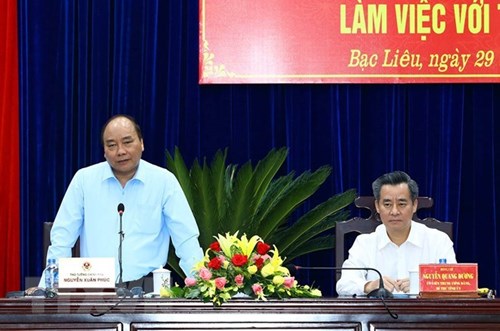The PM met with leaders of Bac Lieu province, the country’s second largest shrimp producer, on January 29 ahead of the investment promotion conference in Bac Lieu on January 30.
Bac Lieu should become the country’s industrial center of shrimp in terms of both shrimp fry and processed shrimp, he said, suggesting the locality employ methodical planning for the sector.
    |
 |
|
PM Nguyen Xuan Phuc addressing the meeting |
Despite limitations and challenges, with the biggest being the adverse impacts of climate change and sea level rises, Bac Lieu still has better conditions than mountainous localities to grow, PM Phuc said.
“As one of the largest shrimp producers nationwide, Bac Lieu should not be a “low-lying area” of the Mekong Delta,” he stressed, adding that with its advantages in shrimp breeding, renewable energy and agriculture, the province needs to swiftly balance its budget.
Apart from setting forth planning on shrimp farming, solar and wind power development, Bac Lieu should promote its tourism strength by organising package tours, completing the tourism ecosystem, diversifying products and connecting with major tourism projects, he said.
The leader also asked Bac Lieu to enhance its connectivity with the Mekong Delta and Ho Chi Minh City.
Applauding Bac Lieu’s achievements in 2017, PM Phuc urged the province to improve the ethics of public servants, prevent group interests, and strive to fulfill its socio-economic targets for 2018.
Bac Lieu has an aquaculture area of 1,290 sq.km. With a coastline of 56 km, three seaports and an economic exclusive zone of 20,742 sq.km, the province has favorable conditions to develop agriculture, fishing and fishery logistics.
Agriculture accounts for 43.14 percent of the province’s gross regional domestic product. Each year, the locality harvests about 210,000 tons of aquatic products, of which 115,000 tons are shrimp, with shrimp export turnover exceeding USD 527 million.
Last year, the province’s economy grew by 6.5 percent and per capita income reached VND 37.5 million (USD 1,650). The locality contributed more than VND 2.8 trillion (USD 132.2 million) to the State budget.
However, climate change and sea level rises caused great losses to local agriculture in recent years.
Source: VNA